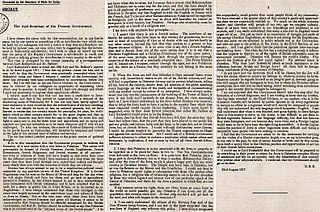
Zionism is a nationalist movement that emerged in the 19th century to enable the establishment of a homeland for the Jewish people in Palestine, a region roughly corresponding to the Land of Israel in Jewish tradition. Following the establishment of the modern state of Israel, Zionism became an ideology that supports the development and protection of the State of Israel as a Jewish state.

A homeland for the Jewish people is an idea rooted in Jewish history, religion, and culture. The Jewish aspiration to return to Zion, generally associated with divine redemption, has suffused Jewish religious thought since the destruction of the First Temple and the Babylonian exile.

Revisionist Zionism is a form of Zionism characterized by territorial maximalism. Revisionist Zionism promoted expansionism and the establishment of a Jewish majority on both sides of the Jordan River.

The World Zionist Organization, or WZO, is a non-governmental organization that promotes Zionism. It was founded as the Zionist Organization at the initiative of Theodor Herzl at the First Zionist Congress, which took place in August 1897 in Basel, Switzerland. The goals of the Zionist movement were set out in the Basel Program.

Religious Zionism is an ideology that views Zionism as a fundamental component of Orthodox Judaism. Its adherents are also referred to as Dati Leumi, and in Israel, they are most commonly known by the plural form of the first part of that term: Datiim. The community is sometimes called 'Knitted kippah', the typical head covering worn by male adherents to Religious Zionism.
The General Zionists were a centrist Zionist movement and a political party in Israel. The General Zionists supported the leadership of Chaim Weizmann and their views were largely colored by central European culture. Their political arm is one of the ancestors of the modern-day Likud.
A Zionist youth movement is an organization formed for Jewish children and adolescents for educational, social, and ideological development, including a belief in Jewish nationalism as represented in the State of Israel. Youth leaders in modern youth movements use informal education approaches to educate toward the movement's ideological goals.

Cultural Zionism is a strain in the concept of Zionism that valued creating a centre in historic Palestine with its own secular Jewish culture and national history, including language and historical roots, rather than other Zionist ideas such as political Zionism. The man considered to have founded the concept of cultural Zionism is Asher Ginsberg, better known as Ahad Ha'am. With his secular vision of a Jewish "spiritual center" in Israel, he confronted Theodor Herzl. Unlike Herzl, the founder of political Zionism, Ha'am strived for "a Jewish state and not merely a state of Jews".
Reform Zionism, also known as Progressive Zionism, is the ideology of the Zionist arm of the Reform or Progressive branch of Judaism. The Association of Reform Zionists of America is the American Reform movement's Zionist organization. Their mission “endeavors to make Israel fundamental to the sacred lives and Jewish identity of Reform Jews. As a Zionist organization, the association champions activities that further enhance Israel as a pluralistic, just and democratic Jewish state.” In Israel, Reform Zionism is associated with the Israel Movement for Progressive Judaism.

The First Zionist Congress was the inaugural congress of the Zionist Organization (ZO) held in the Stadtcasino Basel in the city of Basel on August 29–31, 1897. Two hundred and eight delegates and 26 press correspondents attended the event. It was convened and chaired by Theodor Herzl, the founder of the modern Zionism movement. The Congress formulated a Zionist platform, known as the Basel program, and founded the Zionist Organization. It also adopted the Hatikvah as its anthem.
As an organized nationalist movement, Zionism is generally considered to have been founded by Theodor Herzl in 1897. However, the history of Zionism began earlier and is intertwined with Jewish history and Judaism. The organizations of Hovevei Zion, held as the forerunners of modern Zionist ideals, were responsible for the creation of 20 Jewish towns in Palestine between 1870 and 1897.

The Religious Zionists of America (Hebrew official name: Religious Zionists of America/Mizrachi-Hapoel Hamizrachi, also known as Mizrachi, is an American-based organization that is the official body for those, mostly Modern Orthodox Jews who identify with Religious Zionism and support the goals of the general Mizrachi movement in America, Europe and Israel.

Anti-Zionism is opposition to Zionism. Although anti-Zionism is a heterogeneous phenomenon, all its proponents agree that the creation of the modern State of Israel, and the movement to create a sovereign Jewish state in the region of Palestine—a region partly coinciding with the biblical Land of Israel —was flawed or unjust in some way. Anti-Zionism includes, for example, criticism of the current policies of the state of Israel as well as moral, ethical, or religious criticism of the idea of a Jewish nation-state, in contrast to a secular state.

The common definition of Zionism was principally the endorsement of the Jewish people to return to their homeland, secondarily the claim that due to a lack of self-determination, this territory must be re-established as a Jewish state. Zionism was produced by various philosophers representing different approaches concerning the objective and path that Zionism should follow.
The American Zionist Movement (AZM) is the American federation of Zionist groups and individuals affiliated with the World Zionist Organization. According to its mission, it is committed to Zionism: the idea that the Jewish people is one people with a shared history, values and language.
Post-Zionism refers to the opinions of some Israelis, diaspora Jews and others, particularly in academia, that Zionism fulfilled its ideological mission with the formation of the modern State of Israel in 1948, and that Zionist ideology should therefore be considered at an end. The Jewish right also use the term to refer to the Israeli Left in light of the Oslo Accords of 1993 and 1995. Some critics associate post-Zionism with anti-Zionism; proponents strenuously deny this association.
Labor Zionism or socialist Zionism refers to the left-wing, socialist variation of Zionism. For many years, it was the most significant tendency among Zionists and Zionist organizations, and was seen as the Zionist sector of the historic Jewish labour movements of Eastern Europe and Central Europe, eventually developing local units in most countries with sizable Jewish populations. Unlike the "political Zionist" tendency founded by Theodor Herzl and advocated by Chaim Weizmann, Labor Zionists did not believe that a Jewish state would be created by simply appealing to the international community or to powerful nations such as the United Kingdom, Germany, or the former Ottoman Empire. Rather, they believed that a Jewish state could only be created through the efforts of the Jewish working class making aliyah to the Land of Israel and raising a country through the creation of a Labor Jewish society with rural kibbutzim and moshavim, and an urban Jewish Proletariat.
Aytzim, formerly the Green Zionist Alliance (GZA), is a New York–based Jewish environmental organization that is a U.S.-registered 501(c)(3) tax-deductible nonprofit charity. A grassroots all-volunteer organization, Aytzim is active in the United States, Canada and Israel. The organization is a former member of the American Zionist Movement and has worked in partnership with Ameinu, the Coalition on the Environment and Jewish Life (COEJL), Hazon, Interfaith Moral Action on Climate, Interfaith Oceans, GreenFaith, Mercaz/Masorti, the National Religious Coalition on Creation Care, and the Jewish National Fund (JNF)—although Aytzim has long criticized JNF for not prioritizing sustainability and environmental justice in its actions. Aytzim's work at the nexus of Judaism, environmentalism and Zionism has courted controversy from both Jewish and non-Jewish groups.
Canadian Zionist Federation, or CZF, is a nonprofit organization that promotes Zionism, founded in 1967.
Zionist antisemitism or antisemitic Zionism refers to a phenomenon in which antisemites express support for Zionism and the State of Israel. In some cases, this support may be promoted for explicitly antisemitic reasons. Historically, this type of antisemitism has been most notable among Christian Zionists, who may perpetrate religious antisemitism while being outspoken in their support for Jewish sovereignty in Israel due to their interpretation of Christian eschatology. Similarly, people who identify with the political far-right, particularly in Europe and the United States, may support the Zionist movement because they seek to expel Jews from their country and see Zionism as the least complicated method of achieving this goal and satisfying their racial antisemitism.










